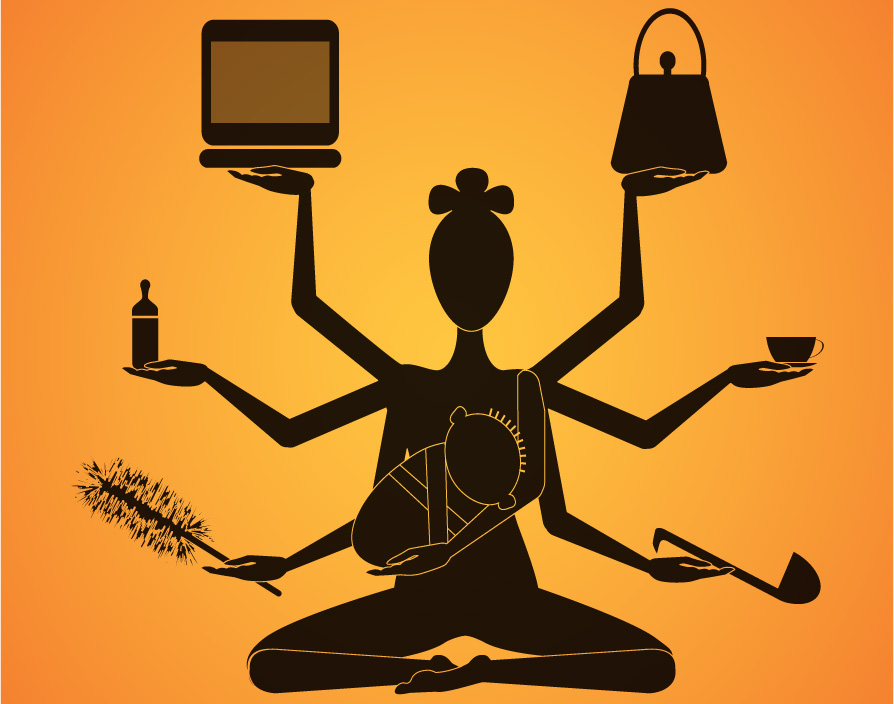Carolyn Radford is no stranger to sexism. As CEO of Mansfield Town FC, the football club, she’s experienced the misogyny of the sport firsthand by the time she gave birth to her first child and then a pair of twins in rapid succession. “I was already seen in a negative light back then purely because I was a female so I’d imagine that me having two pregnancies close together was the icing on the cake for some people who thought that I shouldn’t have been in the role anyway,” Radford remembers.
And as the leader of the club, she couldn’t be totally off on maternity leave but still had to be in the office some days in the week and to be available via phone “Football doesn’t stop, so I couldn’t and I was under constant scrutiny as a I was a 31-year-old, female chief [executive] which is so unusual in this male-dominated industry,” she says. “I felt like I couldn’t take time off or I would have been judged because a man wouldn’t have had to take maternity leave.”
Her situation is far from unique. Along with facing sexism on a daily basis, women in the workplace continue to be discriminated against – especially after they start a family. Indeed, it’s common for female professionals to struggle with balancing the two roles of mother and business leader.
And juggling both is more easily said than done, no matter what you may think. “I wanted to be super mum as well as star employee simultaneously everyday and trying to accomplish such an unrealistic goal left me routinely feeling defeated,” says Amanda Augustine, careers expert at TopCV, the CV building company. “It took me a long time to learn that it’s completely unrealistic to truly balance all the responsibilities that come with raising my child and managing a successful career. At times, my focus is disproportionately placed on one part of my life versus another. And in the beginning, it was difficult accepting this fact.”
Fortunately, she’s learned how to manage the pressure. “Since then, I’ve learnt that there will be good and bad days and that’s OK,” Augustine explains. “Now, I try to celebrate the good days and give myself a pass on the less-than-perfect days. After all, in the end, it’s just spilt milk – or apple juice.”
And Augustine isn’t alone in attempting to balance the two challenging roles of mother and entrepreneur. Motherhood – even with its challenges – hasn’t stopped women like PepsiCo CEO Indra Nooyi, The Huffington Post founder Arianna Huffington and Facebook COO Sheryl Sandberg from balancing both and finding success along the way. Sandberg detailed how difficult it was being a single mother in a Facebook post in 2016 after the death of her husband, a trauma she later wrote about in her book Option B. “For many single mothers, this is the only world they know,” she wrote. “Each and every day they make sacrifices, push through barriers and nurture beautiful families despite the demands on their time and energy.”
While fulfilling the two responsibilities is seemingly difficult for women, it’s easy to see how they’re often left with a feeling of guilt. “I obviously had the mum guilt for working and I still have that now that the boys are all at school but I think that most mums suffer from that in one way or another,” Radford tells.
Indeed, this stands true for most women. According to babycare product company NUK, 69% of 2,000 mums were worried that they haven’t got their work-life balance right which caused them to experience constant guilt.
Given it ain’t easy to be perfect in both, the first step is to ensure not to be bogged down by the pressure put by other head honchos. “Judgement is everywhere and from all angles,” argues Kelly Allison, founder of KVA, the digital communications agency. “You’re judged by other business leaders – mainly male – if you have to rush off because your child is poorly and acceptance is a big issue. Ultimately I know that I’m setting an example [for] my two small girls that women can work and be mum all at once.”
Along with being more accepting and trying to wear both hats at the same time, entrepreneurs must embrace flexible working. “Support parent-friendly company policies such as flexible work hours and certain days working from home – they make a world of difference, especially in those first few years,” Augustine advises. “Offer them to men as well as women so it normalises the adjustments you need to make as a working parent and women don’t feel they stand out like such a sore thumb.”
Additionally, making your office space more conducive to synchronising work and a child is important. “Provide day care services to employees,” suggests Jocette Coote, co-owner of F45 Farringdon and F45 Ravenscourt Park, the gym franchise. “Companies should allow babies to sit at mum’s desk – not a day-care but at the desk [as well as providing] breastfeeding rooms and pumping rooms too.”
While progress can be made and female entrepreneurs continually attempt to strike a balance between the two roles, sexism exists in other forms. For instance, the word mumprenenur has sparked much debate. While many pride themselves to be called so, others fundamentally disagree with the term itself and what it represents. In fact, according to Moneycorp, two-thirds of 500 business leaders regarded mumpreneur as a negative term. “It’s a tricky one because dads aren’t called dadpreneurs,” suggests Katie Taylor, CEO and founder of The Latte Lounge, the virtual networking group for women. “I do understand how a lot of women may find it a sexist term, I’m not defined by being a mum. My children always come before my work so yes I’m a mum and I’m an entrepreneur.”
And Martina Mercer, editor of Sunday Woman Magazine, the lifestyle publication for women, agrees. She said: “The term mumpreneuer is great for those who have businesses centred around their children but as someone who doesn’t like to mix business and personal lives or personal and professional personas I tend to stay away from it.”
Mercer adds: “Work is my time where I’m not a mum, I’m simply me, the entrepreneur, the workaholic, the driven business woman. It’s a complete divide to who I am as a mum and the two don’t mix very well. I’d rather be judged on my professional merits than on my parenting when at work.”
Seemingly, juggling between being a caretaker and a career-driven person is no cakewalk and despite the challenges female entrepreneurs continue to show that they can master both roles. ![]()
Share via:








































